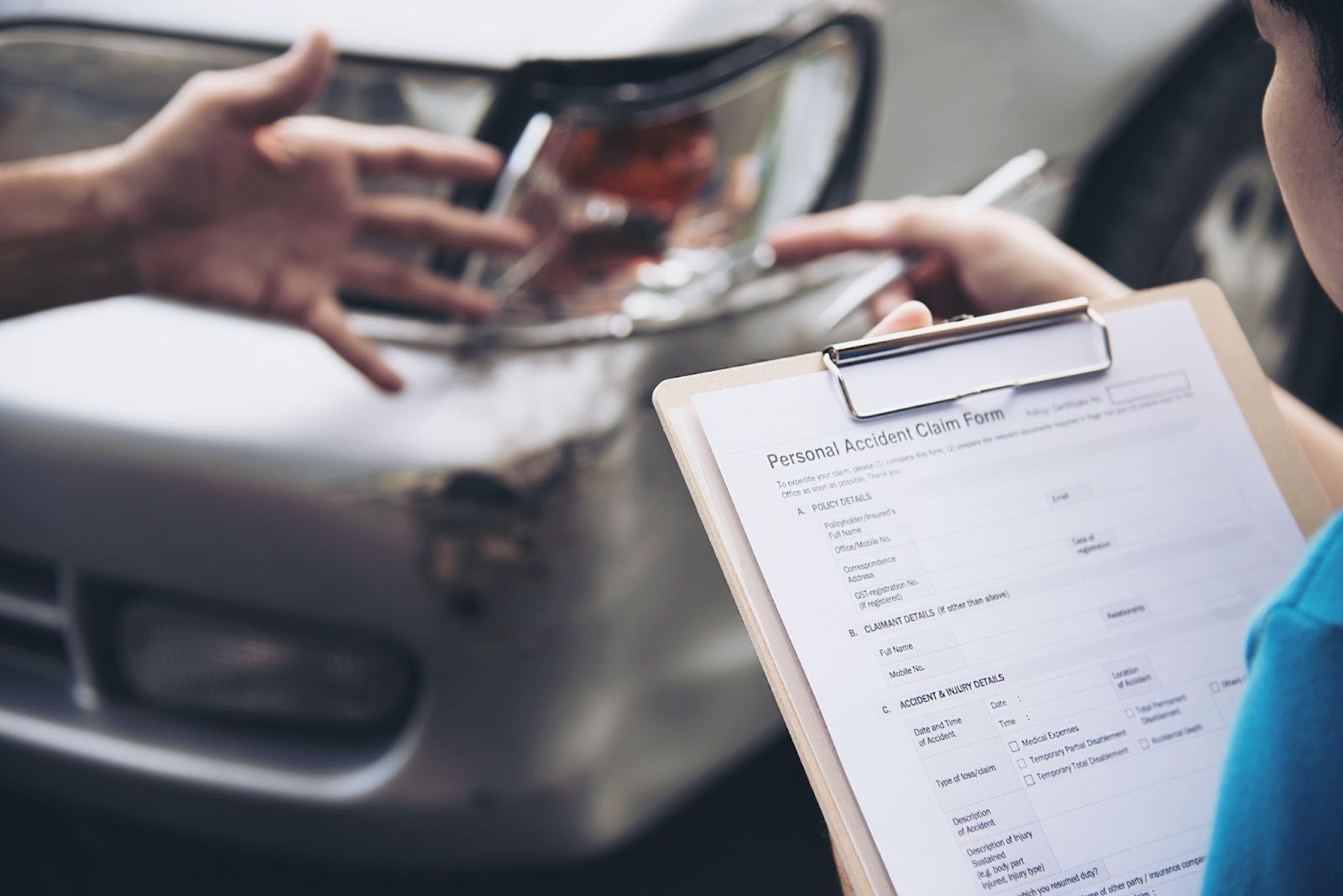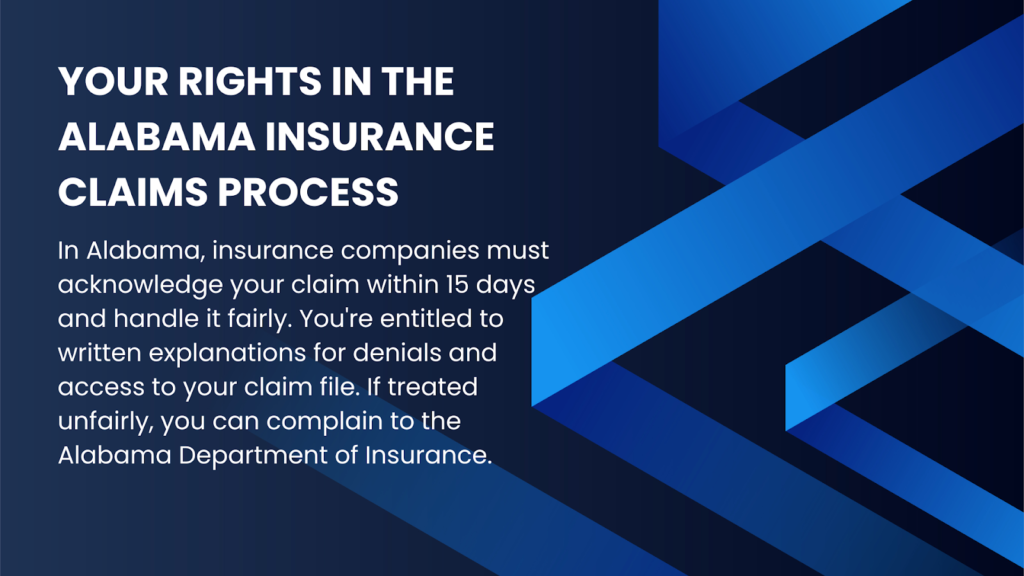
Did you know that Alabama drivers pay an average of $1,994 annually for full-coverage car insurance and $481 per year for state-mandated minimum coverage?
Whether you’re dealing with a fender bender or a total loss, understanding how to navigate the claims process can save you time, money, and stress.
This guide, based on the Alabama Department of Insurance’s standards for claims adjusting, will equip you with the knowledge to handle your vehicle-related insurance claims effectively.
Understanding Your Rights and the Claims Process
When it comes to vehicle insurance claims in Alabama, knowledge is power.
Let’s break down the essentials of the claims process and your rights as a policyholder.

The Basics of Filing a Claim
Filing an insurance claim doesn’t have to be daunting.
Here’s what you need to know:
- Report the incident promptly to your insurance company.
- Gather all necessary documentation, including police reports and photographs.
- Be prepared to provide a detailed account of the incident.
- Understand your policy coverage and limits.
- Keep records of all communications with your insurer.
Remember, the Alabama Department of Insurance requires insurers to acknowledge your claim within 15 days of receipt. This acknowledgment should include necessary claim forms and instructions.
Your Rights as a Policyholder
Alabama law protects you during the claims process. Key rights include:
- The right to fair and prompt claim handling;
- The right to receive a written explanation if your claim is denied;
- The right to request a copy of your claim file; and
- The right to file a complaint with the Alabama Department of Insurance if you believe you’ve been treated unfairly.
Understanding these rights empowers you to advocate for yourself throughout the claims process.
Navigating the Claims Adjustment Process
Once you’ve filed your claim, the adjustment process begins.
This is where the Alabama Department of Insurance’s standards come into play, ensuring fair treatment for all policyholders.
What to Expect During Claim Investigation
Insurance companies must conduct a thorough and unbiased investigation of your claim.
Here’s what you can anticipate:
- An adjuster will be assigned to your case.
- The adjuster will inspect your vehicle and assess the damage.
- You may be asked to provide additional information or documentation.
- The adjuster will determine the extent of coverage based on your policy.
Pro tip: Keep detailed notes of all interactions with your adjuster, including dates, times, and key points discussed.
Understanding Claim Valuation
How your claim is valued can significantly impact your settlement. In Alabama, insurers must use fair and consistent methods to determine the value of your vehicle or the cost of repairs.
This may include:
- Consulting current market values for similar vehicles;
- Obtaining repair estimates from licensed auto body shops; and
- Considering the pre-accident condition of your vehicle.
If you disagree with the insurer’s valuation, you have the right to dispute it. Consider obtaining independent appraisals to support your case.
Dealing With Specific Types of Vehicle Claims
Different types of vehicle claims may require different approaches. Let’s explore some common scenarios.
Collision Claims
When your vehicle is damaged in a collision, here’s what you should know:
- Alabama is an “at-fault” state, meaning the driver responsible for the accident is liable for damages.
- If you’re not at fault, you can choose to file a claim with your own insurance or the at-fault driver’s insurance.
- Your insurer may require you to use specific repair shops or allow you to choose your own.
Remember, if you’re filing a claim with another driver’s insurance, be prepared for potentially longer processing times.
Comprehensive Claims
Comprehensive coverage protects your vehicle from non-collision-related damage.
Key points include:
- Claims typically cover events like theft, vandalism, or natural disasters.
- These claims usually don’t affect your insurance rates as much as collision claims.
- Document the damage thoroughly, as these claims can sometimes be more complex to prove.
Total Loss Claims
When repair costs exceed a certain percentage of your vehicle’s value (typically 75-80% in Alabama), it may be declared a total loss.
In this case:
- The insurer will offer you the actual cash value (ACV) of your vehicle.
- You have the right to negotiate this offer if you believe it’s unfair.
- Consider researching comparable vehicle values in your area to support your case.
Navigating a total loss claim can be complex, but understanding your rights and being prepared to negotiate can help ensure you receive a fair settlement for your vehicle.
Overcoming Common Challenges in the Claims Process
Even with a solid understanding of the process, you may encounter hurdles.
Here’s how to address some common issues:
Dealing with Claim Denials
If your claim is denied:
- Request a written explanation for the denial.
- Review your policy carefully to understand coverage limits and exclusions.
- Consider appealing the decision if you believe it’s unjustified.
- Consult with a public adjuster or attorney if needed.
Handling Disputes with Your Insurer
Disagreements can arise during the claims process. To resolve disputes effectively:
- Communicate clearly and calmly with your adjuster.
- Escalate to a supervisor if necessary.
- Utilize the Alabama Department of Insurance’s complaint process if you can’t reach a resolution.
- Consider mediation or arbitration as alternatives to litigation.
By following these steps and knowing your options, you can work towards a fair resolution of your claim.
Maximizing Your Claim Settlement
While insurance companies must treat you fairly, there are steps you can take to ensure you receive the best possible settlement.
Documenting Your Claim Thoroughly
Proper documentation can make or break your claim. Be sure to:
- Take detailed photographs of all damage;
- Keep receipts for any out-of-pocket expenses related to the claim;
- Maintain a log of all communications with your insurer; and
- Obtain multiple repair estimates if possible.
Understanding Policy Add-ons and Their Impact
Certain policy add-ons can significantly affect your claim settlement:
- Gap insurance covers the difference between your car’s value and what you owe on your loan.
- Rental car coverage can provide transportation while your vehicle is being repaired.
- New car replacement coverage ensures you receive a new vehicle of the same make and model if yours is totaled.
Review your policy to understand which add-ons you have and how they apply to your situation.
Preparing for Future Claims
While no one wants to think about future accidents, being prepared can make a world of difference.
Regularly Reviewing and Updating Your Policy
To ensure you’re adequately protected:
- Review your policy annually or when major life changes occur.
- Consider adjusting your coverage limits as your vehicle ages or your financial situation changes.
- Stay informed about new coverage options that may benefit you.
Creating a Vehicle Emergency Kit
A well-stocked emergency kit can be invaluable in the event of an accident. Include:
- A copy of your insurance card and policy information;
- A disposable camera (in case your phone is damaged);
- Basic first aid supplies;
- A flashlight and extra batteries; and
- Emergency contact information.
By preparing this kit in advance, you’ll be better equipped to handle unexpected situations on the road, potentially making the claims process smoother if an accident does occur.
Frequently Asked Questions
To further assist you, here are answers to some common questions about vehicle insurance claims in Alabama.
How Long Does an Insurance Company Have to Settle My Claim in Alabama?
While there’s no specific timeframe, insurers must act reasonably promptly. The Alabama Department of Insurance recommends that claims be settled within 30 days of reaching an agreement.
Can I Choose My Own Repair Shop?
Yes, Alabama law allows you to choose your own repair shop. However, if you select a shop that charges more than the insurer’s estimate, you may have to pay the difference.
What If the At-Fault Driver Is Uninsured?
If you have uninsured motorist coverage, you can file a claim with your own insurance. Otherwise, you may need to pursue legal action against the at-fault driver.
How Does Alabama’s Contributory Negligence Law Affect My Claim?
Alabama follows a strict contributory negligence rule, meaning if you’re found even 1% at fault for an accident, you may be barred from recovering damages from the other party.
Can My Insurance Company Cancel My Policy After I File a Claim?
While insurers can’t cancel your policy mid-term for filing a claim, they may choose not to renew your policy at the end of the term, especially if you’ve filed multiple claims.
Empowering Yourself in the Claims Process
Navigating vehicle insurance claims in Alabama doesn’t have to be a daunting task. By understanding your rights, following the Alabama Department of Insurance’s standards, and being proactive in the claims process, you can ensure a fair and satisfactory resolution to your vehicle-related issues.
Remember, knowledge is your greatest ally in this process. Don’t hesitate to ask questions, seek clarification, and advocate for yourself.
At Baxley Maniscalco, our experienced team is here to guide you every step of the way, ensuring your rights are protected and you receive the settlement you deserve.
Contact us today for a free consultation. Let’s work together to turn your insurance claim challenges into success stories. Your peace of mind is just a phone call away.
Reach out now and let us help you get back on the road with confidence.
Can't find what you're looking for? Search our site below.










